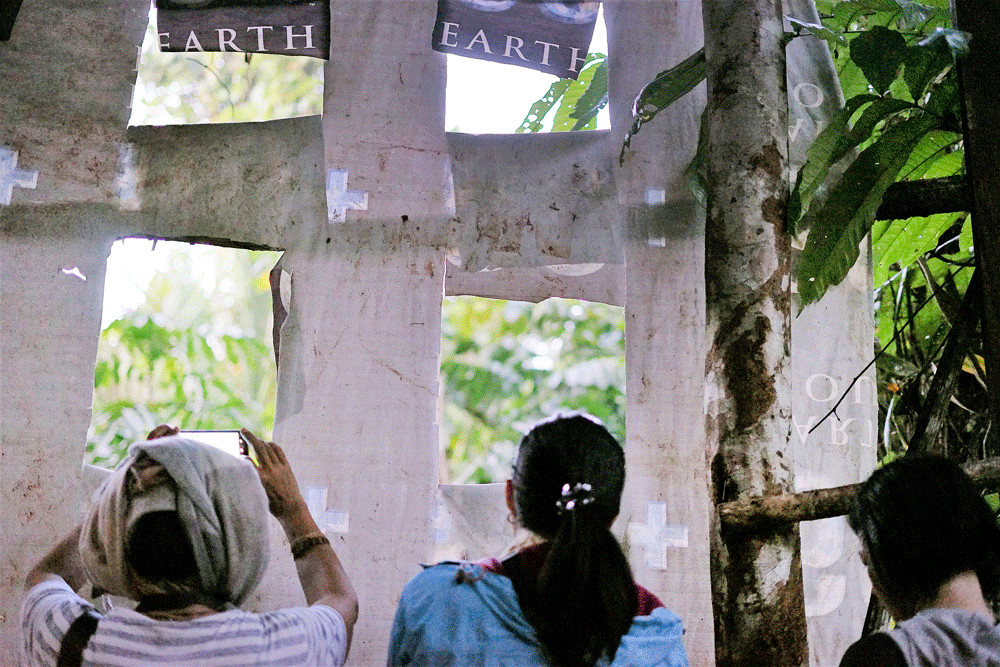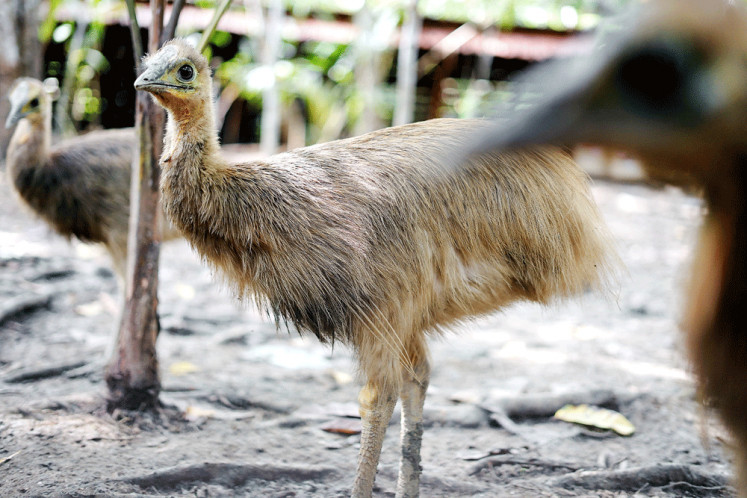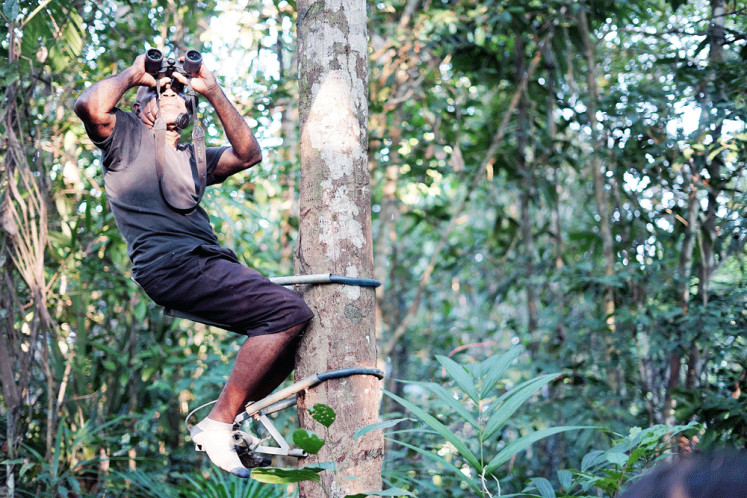Popular Reads
Top Results
Can't find what you're looking for?
View all search resultsPopular Reads
Top Results
Can't find what you're looking for?
View all search resultsBoosting Papua's ecotourism through bird-watching camp
Change text size
Gift Premium Articles
to Anyone
A bird-watching camp in Grime Hill, Papua, finds a way to preserve endemic birds and boost the local economy at the same time.
Ecotourism through conservation has been growing in Papua, thanks to the strong determination of people on Grime Hill, Jayapura regency, in preserving the habitat of the endemic birds.
A double-wattled cassowary stepped close to the wooden fence as Alex Waisimon, 60, approached. Seven other cassowaries followed, slightly swaying as they walked.
The flightless birds rely on the forest floor and tree roots for food and use their nails and beaks to eat and defend themselves. The eight birds in Alex’s enclosure are about seven months old.
The birds have dark brown feathers covering their bodies, especially their backs. Three of them are male, which is reflected by the pale yellow wattles under their chins.
Alex can’t wait to see the birds grow up, when their feathers turn black with glossy blue features around their necks. Adult cassowaries will also develop palm-sized horns.
“They’ve been here for over a month. They were rescued from the hands of smugglers,” said Alex while accompanying the visitors of his Isio Hill Bird Watching camp.
The authorities rescued the young birds from a gang of smugglers in Surabaya, East Java, who planned to take them to Hong Kong.
Alex’s camp in Isio Hills, Rhepang Muaif village, Nimbokrang district, Jayapura regency, was chosen as the birds’ quarantine site.
“I prepared the enclosure with the help of conservation agencies and bird lovers,” added Alex.
The 15-square-meter wooden enclosure located behind a lodging is managed by Alex and his family.
The eight birds roamed around the enclosure, which is equipped with drinking and feeding boxes and small rooms for them to rest.
“They will be returned to the wild. The birds will be fitted with chips so we can monitor their movements in the wild,” he pointed out.
Alex plans to adjust the birds’ diet to prepare for their return to nature.
“At first I gave them bananas, tomatoes and papaya, which they used to be fed in Surabaya. Next year, their feed will wholly be derived from the trees around them,” said Alex.
Alex dearly loves the birds and expressed hope that they would leave the enclosure soon. “They are endemic birds of Papua, thus they must return to Papua’s nature.”
Adult cassowaries lead a solitary life, with males and females only meeting in mating season. The females will lay eggs and let the males protect the eggs until they hatch. The males will look after young chicks until they can survive on their own.
Earlier in the morning, Alex accompanied bird watchers to observe twelve-wired birds of paradise in Isyo Hills.
Closer look: Alex Waisimon of the Isio Hill’s Bird Watching camp invites bird lovers to admire the beauty of Papua’s endemic birds in the Grime Hill forest. (The Jakarta Post/Syafrizaldi)Alex took his guests to a four-story monitoring structure in the forest. The guests, who come from Jakarta and Riau, carefully climbed the wall-less structure.
A twelve-wired bird of paradise was perched at the tip of a log. Alex reminded his guests to remain quiet. Just like a dancer, the male bird flapped its velvet black wings and moved the twelve feathers on its tail. The bird has a long black bill and rich yellow plumes along his flanks.
“Twelve-wired birds of paradise eat fruits and insects,” noted Alex.
The bird kept on dancing and chirped at intervals, but no female mate approached. The female bird of this species is half of the male’s size, with brown feathers and black-barred buffy underparts.
“This species is polygamous, a male has many female mates,” Alex said.
The bird abruptly stopped its dance and fled when a raptor, long-tailed honey buzzard, flew past. Alex quickly used his binoculars to track its movement, but the raptor disappeared within seconds.
“These birds can only be found in New Guinea, Aru Islands, Biak and Yapen,” said Alex.
For Alex, birds constitute Papua’s invaluable treasure. “They must be protected because of their positive impact on the environment and tourism,” he remarked.
Alex developed ecotourism in his home village in Papua in 2015 after spending most of his professional life around the globe. Alex started his career in Red Cross Asia Pacific and later worked for the International Labor Organizations. In 2007, Alex returned to Indonesia and worked as tour guide in Bali.
Upon his return, Alex strived to unite the nine tribes in the 98,000-hectare area to increase the residents’ income through natural protection.
“As soon as I returned to Papua, developing ecotourism was my main goal. Fortunately, the World Wide Fund for Nature (WWF) provided assistance in preparing the bird watching location, planning the lodging’s design and layout as well as incorporating the local community,” Alex recounted.
WWF Northern Papua landscape manager Piter Roki Aluisius said the birds’ presence had contributed to the growth of ecotourism in Papua. Isio Hill’s Bird Watching in Grime Hill recorded a rising number of visitors with most of them being foreign tourists.
“It recorded around 100 visitors in 2014, rising to 200 visitors the next year. In 2018, there were at least 300 visitors,” said Roki.
Grime Hill is a home to 84 bird species from 31 families with five of the species at risk of extinction.
“That’s why Grime Hill is an important location for birds. Six species of birds of paradise have been discovered here. This region also serves as a place to release cassowaries,” Roki concluded.









